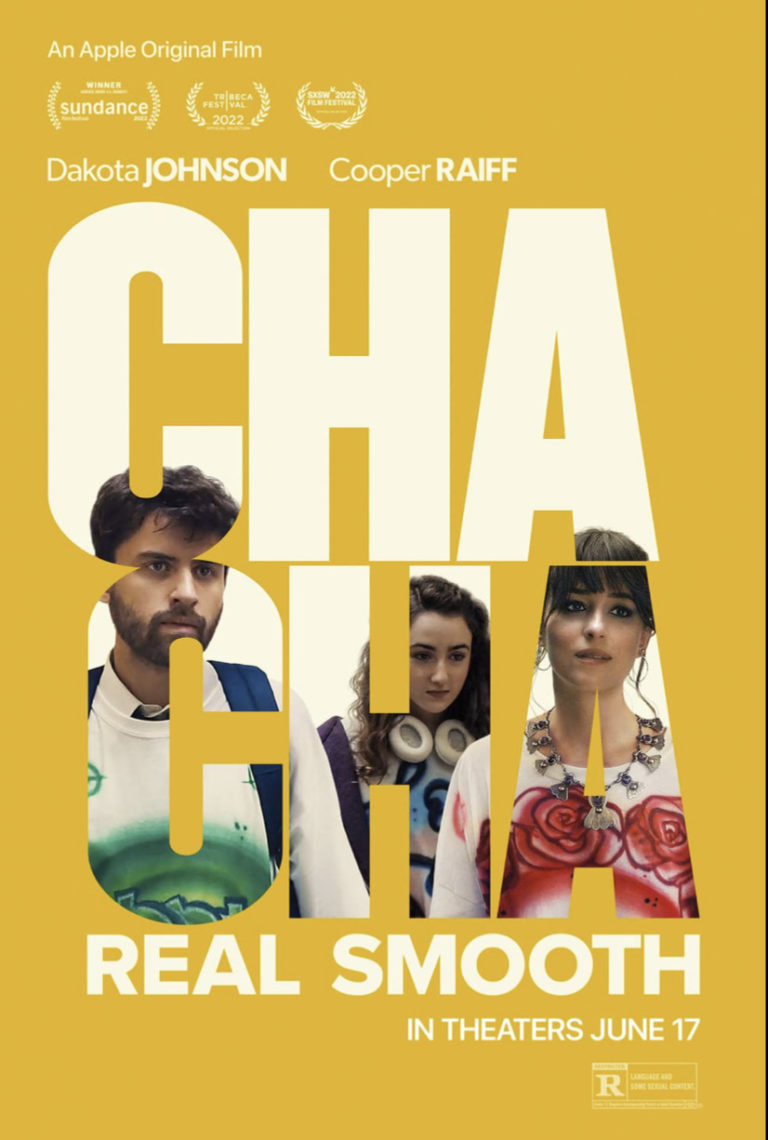
Synopsis : Fresh out of college and without a clear life path going forward, 22-year-old Andrew is stuck back at home with his family in New Jersey. But if there’s one thing that belongs on his nonexistent résumé, it’s how to get a party started, which lands him the perfect job of motivational dancing at the bar and bat mitzvahs for his younger brother’s classmates. When Andrew befriends a local mom, Domino, and her daughter, Lola, he finally discovers a future he wants — even if it might not be his own. Cooper Raiff writes, directs and stars alongside Dakota Johnson, Brad Garrett, Leslie Mann and newcomers Vanessa Burghardt and Evan Assante in this tale of unconventional love that brims with emotional honesty.
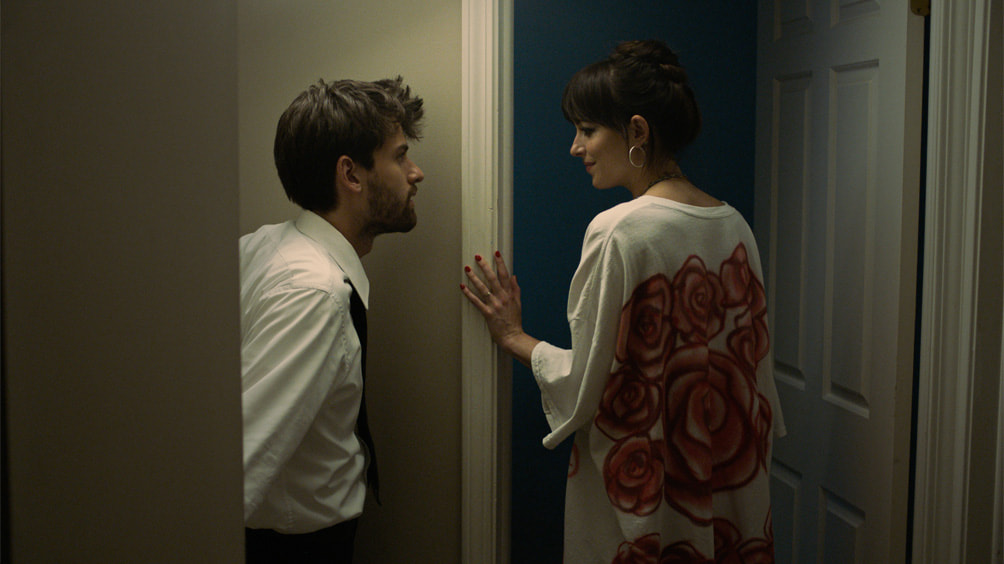
Q: Why did you decide not only to work as an actress in this film, but also as a producer? This isn’t something you do very often. What about this film made you more interested in this aspect of filmmaking.
Dakota: Well, I started my production company(TeaTime Pictures) a little over two years ago, and this was one of the first films that we developed from the beginning. I didn’t just sign on to a script and then produce it. We developed the script together and my company made the movie.
Q: When you were writing this story, did you have the songs in mind which are included here — how did you find them? Those songs are very important to the story.
Cooper: I did write some of them into the script. Like the very last song, I always had it in my head — the big goal for the movie was that, if the last song works, the movie works, but I wrote “24k Magic” by Bruno Mars into the script. Our music supervisor looked at me and said, “I don’t think we can have that song.”
There was a lot of working with Rob Lowry, the music supervisor, to make sure we could afford certain songs. We were trying to be smart. We started this movie with a big song that everyone knows. I think it’s smart to trick the audience into thinking, “Okay, they’re going to play all the bangers.” Then you can kind of get away with songs that people maybe didn’t know, but cost less.
But even songs like “Funkytown” where people know the music, might be less expensive than a Bruno Mars song. It wasn’t all written in the script that some of it was next time. (They selected Lupe Fiasco’s “The Show Go On” Instead)
Q: Dakota, Cooper is an amazing talent, not only as a writer/director, but also as an actor. When did you realize that? What was the experience of being on set with him?
Dakota: It was a really wonderful experience. It’s nice to be working with newer filmmakers. I really appreciate the authenticity and fresh point of view. I like championing up-and-coming artists and he’s really nice to work with.
Q: You are loved in Italy. Are you still in touch with director Luca Guadagnino, and are you planning to do something together? Also, you were amazing in the film, “Lost Daughter.”
Dakota: Oh, thank you. I always talk with Luca. I think we’ll work together again one day, but on the right thing. I loved working with Maggie [Gyllenhaal] on the “Lost Daughter” and I’ve always been a fan of author Elena Ferrante. So to have that movie be something that she liked was, ultimately, a real gift.
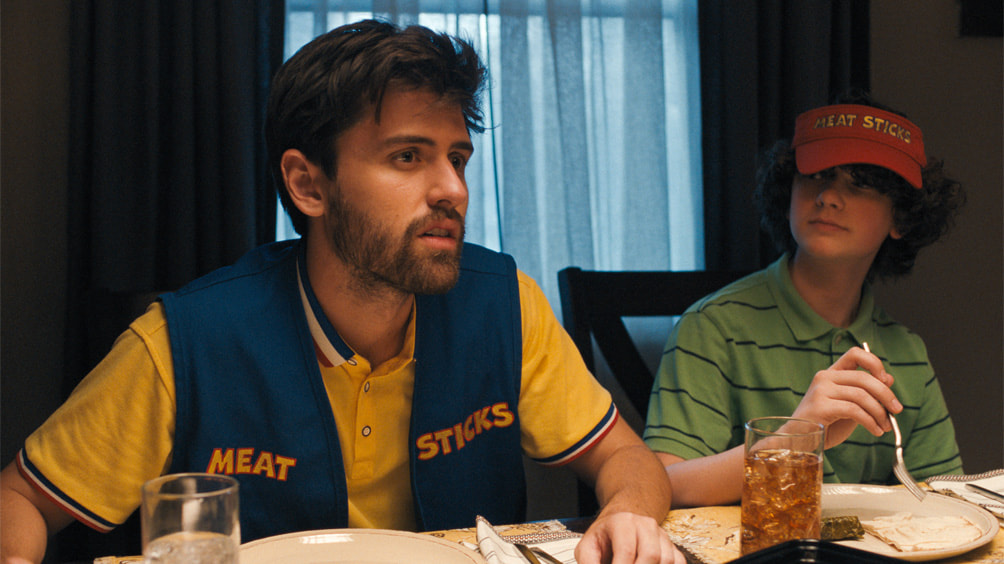
Q: You worked on this for such a long time. What would you say was the most memorable moment in making this film?
Dakota: Probably meeting Vanessa.That’s the most memorable part for me.
Cooper: Was it the coffee or a zoom or was there a particular moment?
Dakota: No, just knowing her.
Cooper: I’d say the same.
Dakota: You have to pick one of us now.
Vanessa: No, I think it was when I met both of you in person at the coffee place. I remember I didn’t want to get out of the car because I was really scared. I was really terrified of meeting both of you. But then, by the end, I felt fine. And you brought your dog.
Copper: It started pouring rain.
Q: Cooper, are there any elements that you can think of that helped you grow as a filmmaker from “Shit House” to this film, going through the COVID [lockdown] and all those things together. Talk about the direction that changed from your perspective.
Cooper: I made my first movie with six people on set. But there are many more people involved with “Cha Cha Real Smooth” and the learning curve was enormous. The major difference between the two was in just having people care about the outcome of the movie. With my first movie, it felt like a very lonely process and there were people who didn’t think the movie was even going to get finished. That movie really felt just like a miracle [getting made] — well all movies do — but with “Cha Cha Real Smooth,” there were people there from the beginning helping see it through. So many people had their DNA in it. That was the big difference.
Q: Vanessa, a lot of people with autism can look up to you, your character and find a voice in you. When you were growing up, did you find any authentic representation in the media, someone you could look up to?
Dakota: When you were growing up, did you ever know anybody with autism that you looked up to?
Vanessa: No, I didn’t, I didn’t see anyone at all remotely. So I thought that I was the problem, but I wasn’t the problem, there just wasn’t anyone like me on screen.
Q: In the production notes, it says that, at first, you didn’t want to participate in this movie as an actor. How did you manage to stay grounded, relaxed and natural in all of those scenes, especially the intimate ones with Vanessa and Dakota. How did you manage to take away all those challenging things as the director and just be in the moment with your scene partners.
Cooper: I was able to feel relaxed and grounded because I had an intimate trust of Dakota and Rhode Donnelly, the other producing partner — she was behind the monitor on every take. I had this manifesto of director notes, possible director notes. It was very easy to be present cause we did so much prep and got all the crazy, anxious feelings out in prep. Then on set, it felt like it was easy to just do the best thing. It didn’t feel like I had this pressure [on me], it was relaxing for most of it. Actually, that’s not true. It was a nightmare on the set, because movies are really hard to make. But being in scenes with Dakota and Vanessa were, for the most part, the easiest part.
Q: Dakota, I heard that the script really touched your soul and you found it very relatable. In which ways did it move you so much?
Dakota: It’s authentic and feels like, we really wanted this movie to feel very specific — we protected the truth of it the whole time. Any person watching it could see themselves or someone they know in their lives [in it] rather than see characters who are totally unattainable. I think that’s why I love it.
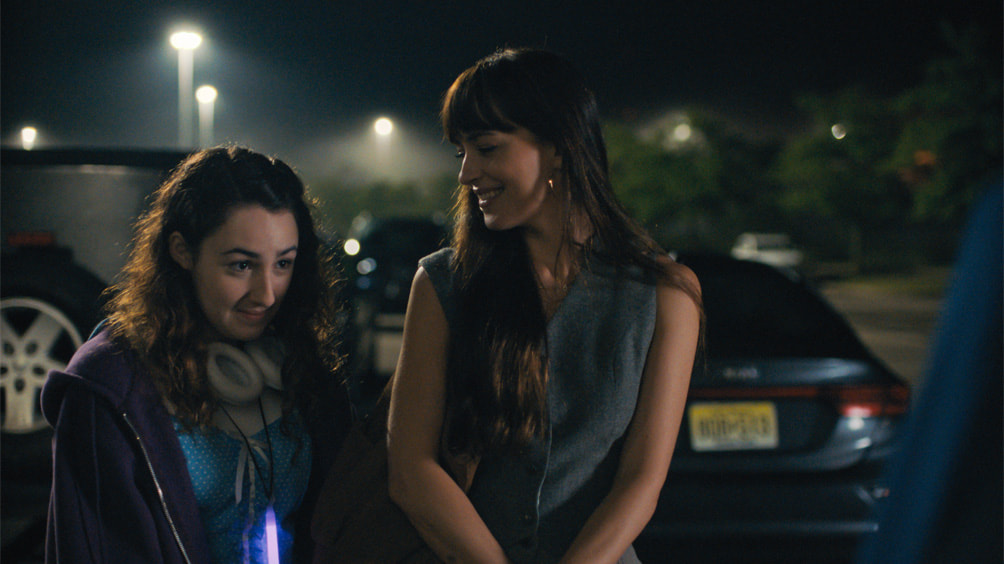
Q: Vanessa, can you tell us about your experience working on this movie? I believe it’s your first movie — how much or how little did you relate to the character of Lola?
Vanessa: Oh, yes. This was my first movie, and I didn’t have any expectations, but it ended up being a really positive experience and a comfortable environment. I think I’m a lot like Lola in some ways, like in my autistic tendencies or traits. I do take up a while to warm up to people but I really care about them. I just express it differently. I’m probably a little bit more socially mature than Lola is.
Q: Dakota, how did you prepare for your role, did you talk to the mother or children with autism?
Dakota: No, I didn’t, I guess I have always observed mothers and when we were developing the script, there was a lot of opportunity to imagine what I dreamed of as to what it was like being this woman, not only in making her someone wanting to be such a wonderful mother where they have this great relationship, but also to bring in the reality of what she was struggling with, its difficulties, her pain and darkness. Then when Vanessa and I met, an organic relationship was built up. I think that’s what was translated on the screen.
Q: Vanessa and Dakota, how did you construct your relationship and connect as human beings?
Dakota: Do you want me to answer it?
Vanessa: Mm-hmm.
Dakota: The thing I appreciate most about Vanessa is that there is no pretense. She wants to have real conversations and any kind of small talk or bullshit conversation is of no interest. I liked knowing what she thinks about things. I appreciate her point of view and when we were on set, I really liked talking to her and I still do. I want you to do everything with us and feel like you’re really included and want you to be as you should be.
Q: Cooper, “Cha Cha Real Smooth” is a movie that has a certain light to it. Where did the idea for this film come from?
Cooper: Originally, the idea was just the character of Domino. From there, I wanted to put her in a relationship with someone who I knew intimately, a 22 year old who doesn’t know much. Then I needed a way for them to come into contact with each other.That’s where the Bar Mitzvah circuit idea came from. Then when I came up with the party starter idea, I think that’s what brought the themes together — of starting other people’s parties but not knowing how to start your own party. Yeah, the original idea was that of a mother of a disabled kid whose stages will be defined by her kid for a long time, maybe forever.
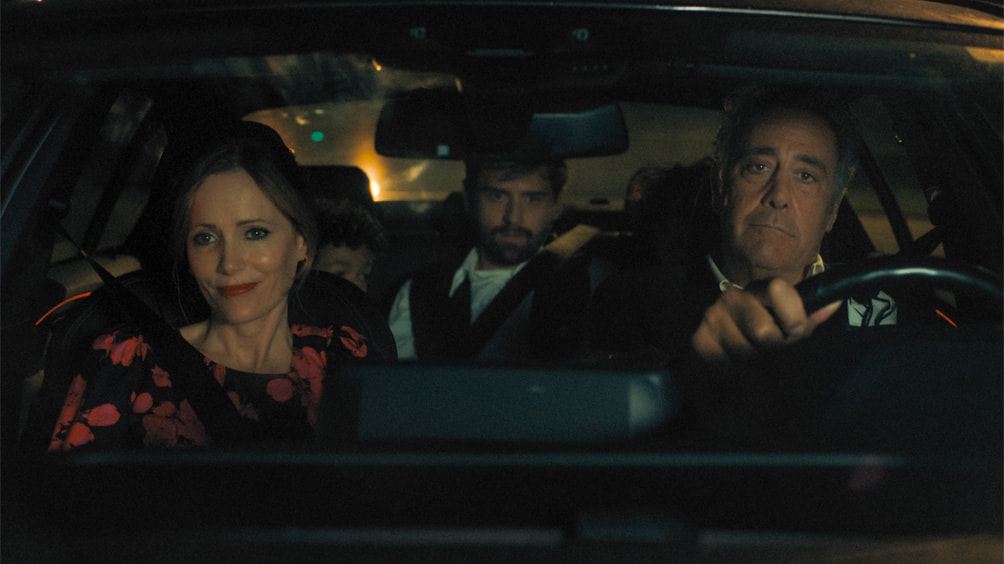
Q: What is the message for people going to see the film regarding autism? What would you like them to learn?
Copper: As the writer, it’s hard to talk about what I wanted people to learn about autism. I think the movie’s core idea of it and where it came from was the centerpiece of that relationship — how specific and intimate and forever and eternal it is. I wanted to say something about that bond. When I started writing the character of Lola, it became more and more specific. Then we saw Vanessa and it changed a bunch. I wanted to tell people about the connection between Lola and Vanessa. I wanted people to learn about her, whatever you think about that fusion. I think there’s things that I did for research or that I asked Vanessa about that were important to writing a character is important. It’s important to really understand and know about them. I think that’s important, but I don’t know if I wanted to send a message about autism.
Cooper: Do you guys want to send a message around this?
Vanessa: I didn’t want to send a message. I wasn’t trying to teach people anything. It was just kind of like demonstrating that autistic people have feelings and they can form relationships; they have empathy and the same base level emotions as everyone else.
Dakota: Yeah. And have an individual human experience. Like everyone else.
Cooper: It’s important to say that about mothers. It was important to say that about dumb 22 year olds and even tall stepdads. It’s always important to me to demonstrate and display a full person.
Q: Dakota, you have a very rich career in terms of diversity of your films and characters that you pick. So how does the process of picking a project work for you and even though you were involved since the beginning of the project, how was that with “Cha Cha Real Smooth.”
Dakota: Now, it’s a really special time for me, because I was able to work with my producing partner Ro (Donnelly), and we’re able to develop my dream projects. I’m able to reach out to directors, writers and people I want to work with. So with this one, when I saw Cooper’s film, “Shit House” and I met with him, I enjoyed his mind and the way he talked about the story. I liked what he wanted to do. I felt like I would fight for it. That it’s something I would want to make. I’ve made a lot of movies where producers didn’t really care at all and didn’t really protect the work, their directors, and their artists. They want to make the most money or try to cater to the masses. But I really wanted to do that, protect the production. So, “Cha Cha Real Smooth” felt like the perfect opportunity to do that. I really care about that, otherwise I’m not on a project. I think the script has to be excellent and the people involved have to be kind and good.
Q: Do you ever think about what went through Domino’s head when you watched yourself on the monitor?
Dakota: For Domino, there’s always a voice in her head telling her she’s not good enough and should go and do something destructive.
I think when she meets Andrew and he sees her in a different way than she’s used to being seen, or, I guess, hasn’t been seen that way by a man, that’s intoxicating for her.
But the reality is that i’ts not real. It’s not tangible in her mind. It’s like this struggle, “Am I going to blow up my life or am I going to do the really hard thing and face my life and be the best mother and partner I can be?” With her, it’s always an internal struggle, a war between darkness and light off camera.
Q: Dakota, we’re living through a very special moment in cinema. Do you think there’s more space for diversity now, for new stories? Even when you are telling about a character like in this film, are there are new ways to [express] them, to go deeper, without [them being] stereotypes? As you said, make them closer to reality with more nuances… Do you think something has really changed at this moment?
Dakota: There are always movies being made that are brilliant. It’s just a matter of who gets to see them, how many get to see them and where. There’s so many movies that I’ve seen that I had never heard of that are brilliant, that have come out in the last 10 years.
It’s just a matter of luck. If you get lucky, your movie goes to Sundance or somebody puts it on Netflix somehow. By the grace of God, Apple buys your movie and you get to do things like this and talk about it. Of course, the larger productions are the ones that everyone knows about. Usually those stories are created because they’ve worked before or were made by an algorithm or something, you know? In terms of inclusion and diversity, that’s changing in the industry, but I believe great movies have always been made. It’s just a matter of if you get to see them.
Cooper: It’s a matter of someone like Dakota championing and wanting to put herself in the middle of it. I think great movies are always being made, but Dakota Johnson isn’t starring in all of them. By the grace of God, Apple bought our movie, but there were reasons outside of it being so authentic that people saw the movie. I think that that’s really important. What’s so great about what Dakota’s production company is doing is staying grounded. And she really cares about that.

